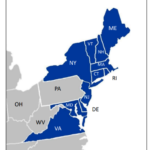By Steve Haner
Attorney General Jason Miyares (R) is defending the Virginia Air Pollution Control Board’s decision to exit a multi-state carbon cap and tax compact as within the regulatory agency’s authority. He has also claimed to the circuit court hearing an appeal of that decision that the plaintiffs were not affected by the action directly and thus have no standing to sue.
The four plaintiffs, all associations, filed a 138-page petition in the Circuit Court of Fairfax County in late August. Miyares’ office used just ten pages total for two responses dated September 13.
As is common practice, the Attorney General’s Office requested that the court dismiss the case right away for lack of merit or on the issue of standing or both. It also challenged the plaintiff’s choice of Fairfax County and sought a change of venue.
The issue involves the Regional Greenhouse Gas Initiative (RGGI), which Virginia joined in 2020. The key question facing the court is interpretation of 2020 legislation. Did that statute as written mandate Virginia’s membership in RGGI or did it merely authorize it? Did that statute, which contemplated the Air Board would join RGGI via a regulation, preclude a future Air Board from withdrawing that regulation?
Unless the court grants this motion to summarily dismiss the case, it will likely drag on past the November elections. The outcome there probably determines more about the future of any Virginia carbon tax, this one or another one.
Even under the pending withdrawal, Virginia is part of RGGI through 2023. Another auction for carbon emission allowances was held in early September, and the state has now collected $730.3 million in less than three years from electric power producers using coal, oil or natural gas. The total could exceed $800 million after Virginia’s final auction in December. Most if not all is passed on to customers one way or another.
The argument in the response raises no unexpected issues.
The Commonwealth is authorized by the Clean Energy and Community Flood Preparedness Act, Va. Code §§ 10.1-1329, et seq., (the “Act”) to participate in RGGI as an auction member—but it is not required to do so. In 2020, Virginia joined RGGI as an auction member via regulation, 9 VAC 5-140-6010, et seq. (the “2020 Regulation”) …. Recognizing the fundamental flaws in RGGI’s design that both kept its purported benefits from materializing and generated skyrocketing costs, the Air Board followed proper administrative procedures and exercised its discretion in 2023 to withdraw from the initiative.
That addresses with the claim from the appellants that the Air Board had no authority to withdraw without a change in law. The response then moves on to:
Claim II, which hinges on the remarkable assertion that Respondents exceeded their statutory authority by considering the cost of a regulation, fails legally and factually. As an initial matter, the Air Board is not just legally permitted to consider the costs imposed by its regulations, it is required to do so. Moreover, in a regulatory regime, like RGGI, that seeks to obtain benefits by imposing costs on certain conduct, the cost of the regulation is its defining feature.
Finally, the supporters of RGGI claimed the Air Board acted arbitrarily, without foundation.
Claim III presents a sufficiency of the evidence challenge. It fails because substantial evidence supports the Air Board’s decision to adopt the 2023 Regulation. Substantial evidence merely requires that there be evidence that a reasonable mind might accept as adequate to support a conclusion. And an agency’s decision must be upheld unless a reasonable mind would necessarily come to a different conclusion.
The challenge was filed by The Association for Energy Conservation Professionals, Virginia Interfaith Power and Light, Appalachian Voices and Faith Alliance for Climate Solutions. The Southern Environmental Law Center in Charlottesville is their counsel.
The Floyd County-based association of individuals or companies providing energy conservation services probably have the strongest claim of direct harm from the Air Board’s decision, since some were probably being paid out of the RGGI proceeds. The others exist to oppose and eventually eliminate the use of fossil fuels, as they outline in their own petition. Defending their right to appeal this regulatory decision will probably dominate the next round of paperwork.



